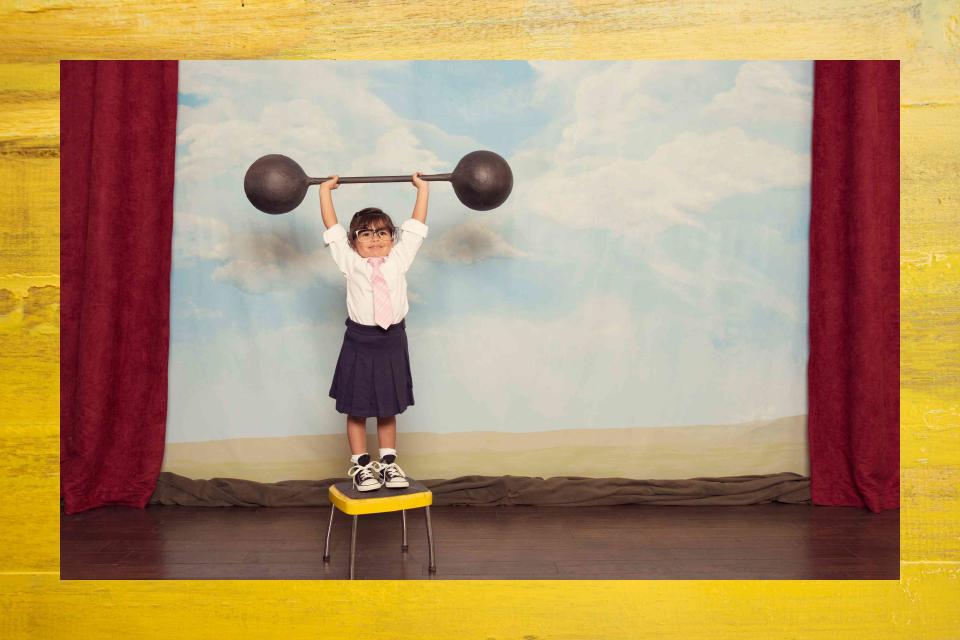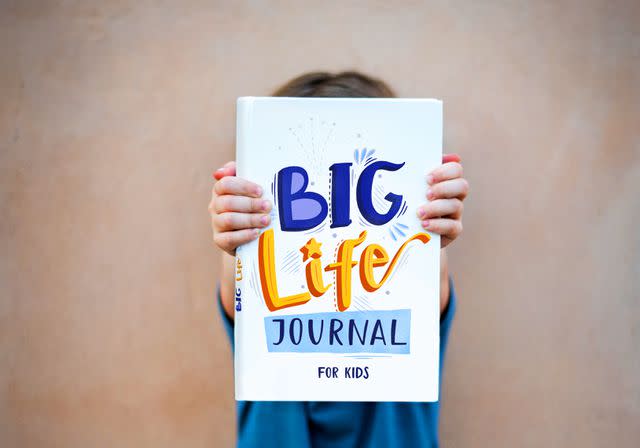How To Foster a Growth Mindset in Children
A growth mindset sets kids up for success by focusing on the positive. Here's how experts say you can help your child (and yourself!) look on the bright side.

Getty Images (2)
Medically reviewed by Wayne Fleisig, Ph.D.
Some kids just know how to look on the bright side. Others have to work on it a bit. The good thing is, optimism can be learned. And there's real science behind the process of positivity—it's called a growth mindset.
A few years ago, when my son Shaiyar was about 6, I noticed that he’d get down on himself about small setbacks, like losing a video game match to his sister or getting the wrong answer to a math problem. He tended to beat himself up about things, and it went far beyond a mild wallow to a full-on mope—often for hours. He just let little things ruin his day, and there was no consoling him once it set in.
I remember one particular moment: we’d been planning a weekend outing to the local science center and got snowed out. Cue the tantrum, right? But at that moment, something shifted. We decided to focus on fun and see what we could do to save the day—by making hot cocoa and setting up our own science experiment in the kitchen with a volcano that actually erupted, thanks to a little baking soda and vinegar. Plus: snowball fights later that afternoon. It was such a fun day and became one of our favorite winter memories.
Later, I learned that there solid, practical steps I could take as a parent to cultivate a more upbeat attitude in my kid (and myself), to build resilience and a happier outlook.
Here's how you can help your child cultivate a growth mindset.
Related: How to Teach Your Kids to Own Their Mistakes
What Is a Growth Mindset?
As first defined by Carol Dweck, PhD, a professor of psychology at Stanford University, in her 2014 Ted Talk and in her book Mindset: The New Psychology of Success, A growth mindset is an open, rather than fixed, way of looking at the world and your place in it. It’s the belief that, with time, effort, and practice, you can expand your abilities—essentially, that talent can be grown and cultivated.
“In simple terms, I think of growth mindset as the idea that our abilities and what we're capable of are ever changing and ever evolving, and we have the potential to work on them and to expand upon them,” says Saumya Dave, MD, a board-certified psychiatrist and author based in New York City. “And they're not a limited thing that we're born with. It's an openness and a flexibility and a growth, versus a rigidity.”
On a kid-friendly level, growth mindset is "the idea that we can always learn and grow, even in areas where we may currently struggle,” says Alexandra Eidens, author and creator of The Big Life Journal, which helps kids develop a growth mindset. “The roots of the philosophy can be traced back to the work of psychologist Jean Piaget, who emphasized the importance of actively engaging with new experiences to learn and grow.”
The shift to a growth mindset can be very subtle, says Mister Brown, the creator of the Choose Well program and a motivational speaker and consultant for schools, libraries, and parents nationwide. But once you get it, it can be profound.
"“Your mindset is like a thermostat. You can shift the temperature on the thermostat so that it works for you. Your mindset works in the same way. Shift it from ‘have to’ to ‘get to’ and you’ll start to see the whole world differently.”
—Mister Brown, Growth Mindset expert
"
“Your mindset is like a thermostat. You can shift the temperature on the thermostat so that it works for you. Your mindset works in the same way," Brown explains. "Shift it from ‘have to’ to ‘get to’ and you’ll start to see the whole world differently. I want to control that dial to make sure I get where I want to be going.”
Brown says the thermostat metaphor is an easy way to teach kids to grasp how to grow and shift their own thinking. “When you ‘get to,’ that’s when you’ll make the better choice—and live the better life.”
Related: 6 Mindfulness and Meditation Apps for Kids
What Are the Benefits of a Growth Mindset for Kids?
One of the main benefits of a growth mindset for children is that it can help them become more resilient and handle disappointments much easier. “When children encounter challenges, they are more likely to bounce back and try again if they have a growth mindset,” says Eidens. “They understand that mistakes are opportunities to learn and that success often requires effort and perseverance.”
That’s because adopting a growth mindset can help boost kids’ confidence. “When children believe that their abilities can improve over time, they are more likely to take on new challenges and feel confident in their ability to succeed,” Eiden explains. “This can help them develop a positive sense of self-worth and feel more capable of trying new things.”
When they feel confident, Eidens notes, they’re more open and willing to try new things. “A growth mindset can help children develop a love of learning,” she says. “With a growth mindset, children view learning as a lifelong process. As a result, they are more likely to stay curious.”
How To Foster a Growth Mindset in Children
While some people innately have a growth mindset, others need to work on developing one—and that goes for adults and kids alike. Luckily, as a growth mindset will tell you, it too can be developed with training and practice.
Focus on the positive
“At its most basic, it’s about finding the positive aspect of any situation,” says Dr. Dave. “And that makes growth mindset such a powerful reframe for any of us, at any age. ‘I get to do this. I love that,’’ she says. “And what's so interesting and incredible about kids is that they're so psychologically flexible. So they take that in and adapt and apply it to all these different situations.”
Dangle the carrot
Let’s face it, not every task in life is going to be fun. “But that doesn’t mean we can’t be grateful that we get to do it,” says Brown.
Brown says rewards are a great way to motivate kids to be positive about even the most annoying activities. “Homework? Yeah. But then you get to learn math and turn it in and get the good grade. And once it’s done, maybe you get to play your video games for a while.” Or if you eat your broccoli, you get a square of chocolate. “There’s always a bright side. You’ve just got to learn to look for it.”
Center the journey, rather than the outcome
“There's a lot of pressure on performance, on results, on fitting into certain parameters that we've decided are the worthy ones,” says Dr. Dave. “And my worry about that is that we've actually lost the beauty of the journey and of the trying and of the skills we're trying to develop. We're so focused on the outcome instead. Praise the efforts, rather than the outcomes. The experience of doing and trying—and even failing—is what’s important.”
Embrace failure
“A growth mindset allows us to look at something and ask, ‘Well, what can I put back into this if I didn't do well on it this time? What can I do to change that outcome next time?’” says Dr. Dave. “I think it also offers this really powerful word that is at the center of it: yet. ‘I'm not good at this—yet!’”
The key, Dr. Dave notes, is knowing that you can fail and try again. “One of the most important things that we can do is put our focus more on our efforts rather than our results, and that in turn can lead to a much more comfortable relationship with failure,” says Dr. Dave.
Learn to be grateful
Gratefulness is a practice, Brown says, and that means working on it every day. This can be as simple as keeping a journal and tracking three things that were awesome about your day.
But Brown and his family take it one step further. “At dinner, we go around the table and play the ABCs of being grateful,” he says. “So you say something great with A and then B, and then C. And you get extra points if you can do a triple letter score. Like, I’m thankful for awesome Andrea, who's amazing. It’s great because you get to say what you’re grateful for—and hear what others are grateful for, too. It really makes you learn to look for the things you’re thankful for. It builds that muscle of being grateful.”

Big Life Journal
Expert Tips to Help Kids Develop a Growth Mindset
There are easy ways to encourage a growth mindset in everyday life and set it up as a model for how your kids approach the world. Here, Big Life Journal creator Eidens shares some strategies parents can use to cultivate a growth mindset in kids.
Change the way you praise. The benefit of using growth mindset praise instead is that it emphasizes that success is earned through effort and trying different approaches. "Even if a child doesn't achieve their desired outcome, we can still acknowledge their hard work and effort," explains Eidens. "This helps them stay motivated and understand that the main goal is to learn and improve, rather than simply get high scores or win awards. Growth mindset praise can sound like, ‘You worked hard and persevered through challenges!’"
Model the maybes. “Narrate out loud when we make mistakes and emphasize what we learned from them," says Eidens. "For instance, 'Whoops, I made a mistake in this recipe. No worries, mistakes are part of learning. Let's see what we can do to fix it and try again.' This shows our children that making mistakes is natural and that we can learn from them."
Try something new—and embrace the results, good or bad. When encouraging a growth mindset, Eiden suggests trying new activities—and embracing the potential for failure they bring—often. “We can take on new challenges, such as learning a new skill or trying a new hobby, and involve our children in the process,” she says. “By sharing our challenges and how we handle them, we can show our children that even as adults, we are constantly learning and growing.”
When in doubt, write it out. Journaling the process and what you’ve learned can be a great way to develop that growth mindset muscle. In fact, that’s why Eiden and her husband, Scott, first created the Big Life Journal. “We wanted to create something that would be both fun and informative, something that kids would actually enjoy using and parents would feel good about using with their children," says Eidens. "Through The Big Life Journal, kids learn that their mindset can be the key to achieving their dreams and goals. By practicing positive self-talk, setting goals, and persevering through challenges, they can develop the resilience and determination they need to succeed in life.”
Big Life also offers a free growth mindset versus fixed mindset quiz that parents and kids can take to start to understand their own mindset, along with free resources, including Friday Printables, published weekly.
For more Parents news, make sure to sign up for our newsletter!
Read the original article on Parents.

